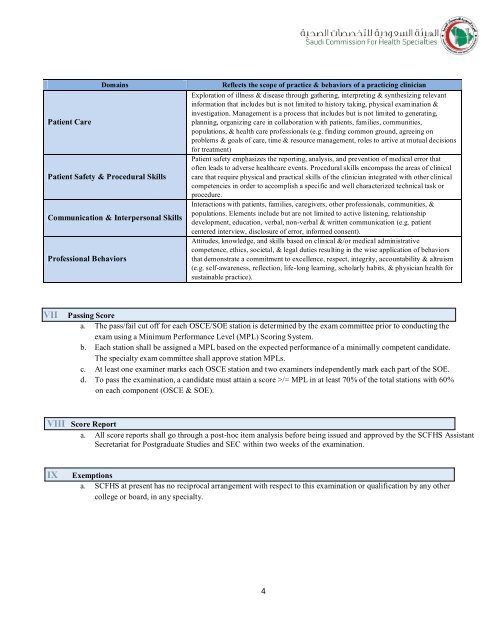EMERGENCY MEDICINE SAUDI BOARD PROGRAM
%D8%A7%D9%84%D8%A7%D9%85%D8%AA%D8%AD%D8%A7%D9%86%20%D8%A7%D9%84%D9%86%D9%87%D8%A7%D8%A6%D9%8A%20%D8%A7%D9%84%D8%B3%D8%B1%D9%8A%D8%B1%D9%8A
%D8%A7%D9%84%D8%A7%D9%85%D8%AA%D8%AD%D8%A7%D9%86%20%D8%A7%D9%84%D9%86%D9%87%D8%A7%D8%A6%D9%8A%20%D8%A7%D9%84%D8%B3%D8%B1%D9%8A%D8%B1%D9%8A
Create successful ePaper yourself
Turn your PDF publications into a flip-book with our unique Google optimized e-Paper software.
Domains<br />
Patient Care<br />
Patient Safety & Procedural Skills<br />
Communication & Interpersonal Skills<br />
Professional Behaviors<br />
Reflects the scope of practice & behaviors of a practicing clinician<br />
Exploration of illness & disease through gathering, interpreting & synthesizing relevant<br />
information that includes but is not limited to history taking, physical examination &<br />
investigation. Management is a process that includes but is not limited to generating,<br />
planning, organizing care in collaboration with patients, families, communities,<br />
populations, & health care professionals (e.g. finding common ground, agreeing on<br />
problems & goals of care, time & resource management, roles to arrive at mutual decisions<br />
for treatment)<br />
Patient safety emphasizes the reporting, analysis, and prevention of medical error that<br />
often leads to adverse healthcare events. Procedural skills encompass the areas of clinical<br />
care that require physical and practical skills of the clinician integrated with other clinical<br />
competencies in order to accomplish a specific and well characterized technical task or<br />
procedure.<br />
Interactions with patients, families, caregivers, other professionals, communities, &<br />
populations. Elements include but are not limited to active listening, relationship<br />
development, education, verbal, non-verbal & written communication (e.g. patient<br />
centered interview, disclosure of error, informed consent).<br />
Attitudes, knowledge, and skills based on clinical &/or medical administrative<br />
competence, ethics, societal, & legal duties resulting in the wise application of behaviors<br />
that demonstrate a commitment to excellence, respect, integrity, accountability & altruism<br />
(e.g. self-awareness, reflection, life-long learning, scholarly habits, & physician health for<br />
sustainable practice).<br />
VII<br />
Passing Score<br />
a. The pass/fail cut off for each OSCE/SOE station is determined by the exam committee prior to conducting the<br />
exam using a Minimum Performance Level (MPL) Scoring System.<br />
b. Each station shall be assigned a MPL based on the expected performance of a minimally competent candidate.<br />
The specialty exam committee shall approve station MPLs.<br />
c. At least one examiner marks each OSCE station and two examiners independently mark each part of the SOE.<br />
d. To pass the examination, a candidate must attain a score >/= MPL in at least 70% of the total stations with 60%<br />
on each component (OSCE & SOE).<br />
VIII Score Report<br />
a. All score reports shall go through a post-hoc item analysis before being issued and approved by the SCFHS Assistant<br />
Secretariat for Postgraduate Studies and SEC within two weeks of the examination.<br />
IX<br />
Exemptions<br />
a. SCFHS at present has no reciprocal arrangement with respect to this examination or qualification by any other<br />
college or board, in any specialty.<br />
4


